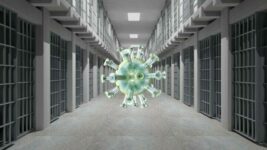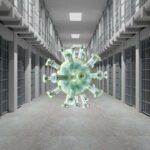Calls to Release ‘Low Risk’ Inmates, as COVID Spreads in NSW Prisons

The New South Wales Government has locked down prisons across the state, as the COVID-19 outbreak at the Parklea Correctional Centre hits more than 70 cases.
Parklea is a large prison facility in North-West Sydney where inmates often spend their ‘induction’ period, during which they are classified before they are transferred to the prison to serve their full sentence.
It is also a facility where defendants are held on remand if refused bail, and spend their time while awaiting the finalisation of their cases.
While all new inmates undergo a 14-day period of isolation as a COVID-19 preventative measure, the prison now has the largest outbreak within the prison population in the state since the pandemic began.
The outbreak has raised concerns it could lead to a much wider problem, a fear which has been enhanced by a rise in cases at Bathurst Prison. Nine inmates and six staff have tested positive to COVID-19 in that facility.
According to NSW Health, there are currently 125 COVID-19 cases in the state’s correctional facilities, 27 of which emanate from unknown sources.
Renewed calls to release non-violent and vulnerable inmates
There have long been concerns that COVID-19 would enter and quickly spread behind prison walls, a concern compounded by prison overcrowding in New South Wales.
Both staff and inmates intermingle in closed environments, creating a perfect breeding ground for any contagion.
For that reason, there have long been calls to release non-violent inmates and elderly or infirm inmates from prison, to decrease the potential for the spread by reducing overcrowding and removing those who are the most likely to suffer severe effects. The current outbreak has renewed those calls.
NSW Deputy Chief Health Officer Marianne Gale recognises the benefits of such a move, telling the media:
“From a health perspective, clearly we are concerned about prisons as a setting for spread”.
“We know the conditions in prisons often are conducive to the spread of communicable diseases… the fewer people and the less overcrowding in the prison system is useful”.
Inmates are disproportionately vulnerable
Almost one-third of people entering prison have a chronic medical condition such as asthma, cancer, cardiovascular disease, diabetes or live with disability which makes them particularly vulnerable to COVID-19 and it’s more contagious variant, Delta.
Aboriginal and Torres Strait Islander people in prison are also at great risk, because many suffer higher rates of chronic health issues than non-Indigenous people.
There is a purpose built quarantine facility at the Silverwater Correctional Centre in Sydney, but that is now at capacity with 42 prisoners in managed isolation.
Vaccination rates in prisons aren’t being released
Despite the outbreak, the source of which is reported to be unknown, the NSW Government is refusing to be transparent about the number of inmates who have been vaccinated against COVID-19.
Inmates and staff were both singled out as priority vaccination recipients in the federal government’s rollout plan, but the NSW government will not reveal vaccination rates for the prison population as it has with other groups such as disability or aged care residents.
Lockdowns in prisons are considered necessary to protect inmates at this time, but they’re far from ideal.
Prisons can be a volatile hotbed at the best of times, but without access visits from family and friends, and even lawyers, inmates become frustrated and angry which is leading to a rise in the number of outbursts behind bars. Last year there were prison riots here, and across the globe.
Currently prisoners are not allowed to use recreational areas, and are locked inside prison cells, in many cases, with multiple inmates in one cell, there is no possibility of social distancing.
Last year, the NSW Parliament passed emergency laws to assist in dealing with the COVID-19 pandemic, which included a provision that allows the NSW Corrective Services Commissioner to grant prisoners who meet a strict criteria, early parole.
There are a number of safeguards in the legislation, and it is intended that only non-violent, elderly and frail offenders are granted early release, along with non-violent offenders nearing the end of their sentence.
Other countries released prisoners on a similar basis at the height of the pandemic, but it is unclear whether or not NSW has actually acted upon this law – no figures have yet been reported.
The writing was on the wall weeks ago
But it would appear from the crisis that is now beginning to unfold rapidly behind bars that the Berejiklian Government has been focused elsewhere.
This is despite clear warning signs earlier this month, when a COVID-positive man who had been bailed out of the Bathurst prison where his coronavirus test was taken, visited Dubbo, and returned home to Walgett in the remote north-west of the state by the time his test results were available.
The incident led the Western Local Health District to warn of coronavirus circulating in vulnerable Aboriginal communities, and the state government to implement a snap lockdown across western NSW.
Health authorities were shocked to hear that test results were taking four days to complete.
Now, as the state’s 13,118 prisoners sit anxiously behind bars NSW chief medical officer, Dr Kerry Chant, has promised the government would look at introducing rapid antigen testing in prisons as well as ramp up the vaccination of inmates.
But under the current circumstances, this may prove to be ‘too little, too late.’







